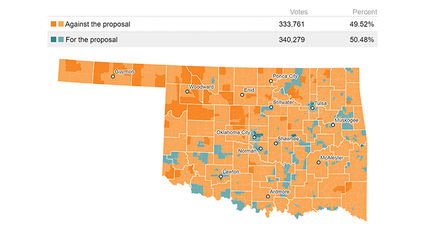How Oklahoma voted on Medicaid expansion
July 5, 2020
In the end, the narrow passage of State Question 802 to expand Medicaid in Oklahoma came down to a lopsided arithmetic: Only seven counties voted in favor of the proposal, and 70 counties voted against.
But four of those counties are among the five most populous in the state, reflecting a general urban-rural divide in the voting results. However, several other traits differentiate some of those seven counties, suggesting that other possible cultural, political and economic factors influenced the vote. And within many counties were precincts that defied their county's overall vote.
View our interactive map with county- and precinct-level results to look for other trends. Click on a county to zoom in to individual precincts.
The counties voting yes were Oklahoma, Tulsa, Cleveland, Comanche, Cherokee, Payne and Pontotoc.
Oklahoma, Tulsa and Cleveland are the three most populous counties in Oklahoma, and Comanche ranks fifth. Canadian County broke from the trend; it's the state's fourth largest county but voted no.
Two of the seven counties, Cleveland and Payne, are home to the state's largest universities. Two other counties, Pontotoc and Cherokee, are homes to the headquarters for major tribes, the Cherokee Nation's in Tahlequah and the Chickasaw Nation's in Ada. Those counties also have more registered Democrats than Republicans. There were other counties where Democrats outnumber Republicans, however, that voted no. And in Bryan County, home to the Choctaw Nation headquarters in Durant, voters gave SQ 802 a thumbs down.
Some counties that have seen local hospitals close in the past decade voted against Medicaid expansion, in some cases overwhelmingly. Those counties include Garvin County, where the Pauls Valley General Hospital closed; Beckham County, former home of Sayre Community Hospital; Latimer County, site of the former Latimer County General Hospital in Wilburton; and Muskogee, Haskell, Tillman, McIntosh and Canadian counties, all of which lost hospitals.
Saving rural hospitals was one of the big pitches to voters that supporters of the state question made. Some experts have said the issues with struggling rural hospitals go well beyond Medicaid expansion, including a shortage of primary care doctors and specialists, falling population and less than desired Medicare reimbursements.




Reader Comments(0)